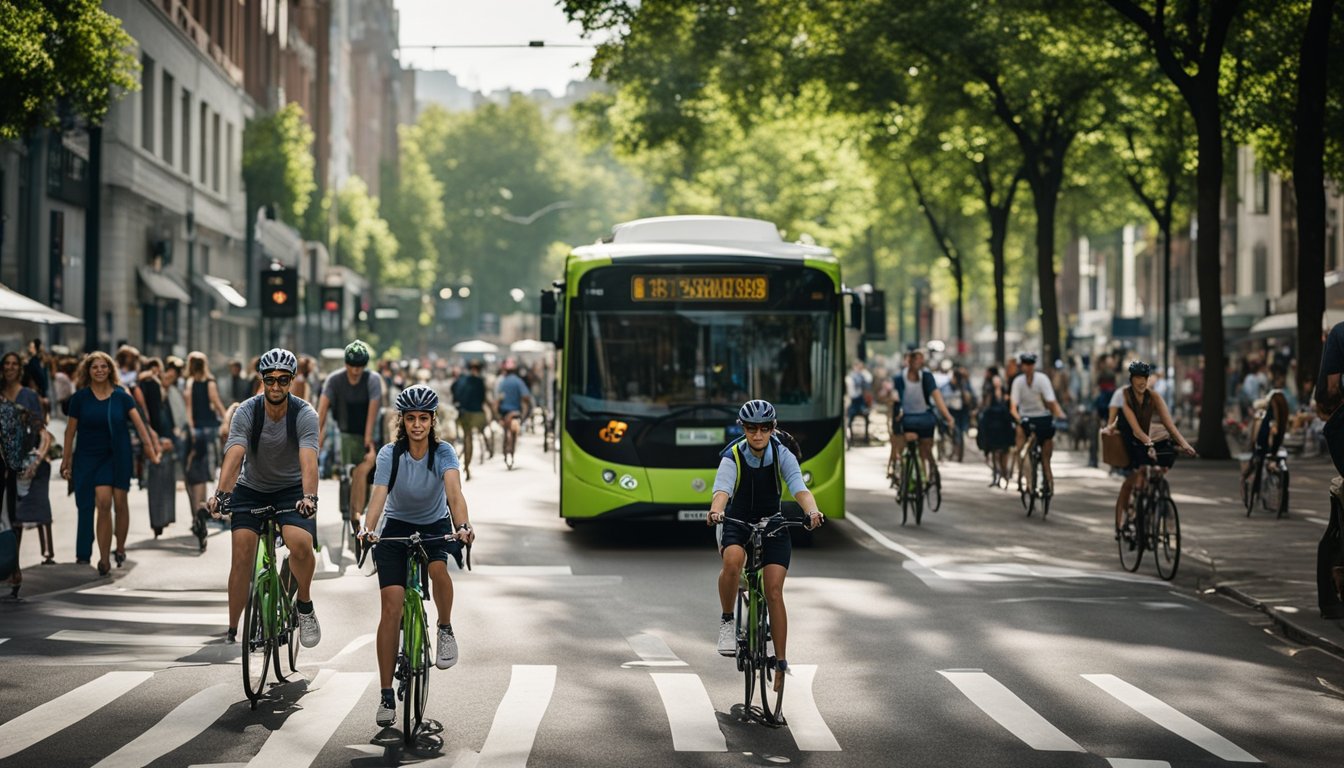Late updated: 21 Jan 2025 12:01
Written by: Amber Collins
Exploring Sustainable Commute Habits for UK SMEs: A Path to Eco-Friendly Workplaces
Exploring sustainable commute habits for UK SMEs is a step towards not only reducing our environmental impact but also enhancing our workplace culture. By adopting sustainable commuting practices, we can significantly decrease greenhouse gas emissions and create a more efficient and eco-friendly business environment. The changes we make today extend beyond just reducing our carbon footprint; they help to bolster our organisation's reputation and align us with broader societal expectations.

During the recent pandemic, we witnessed a dramatic reduction in commuting emissions, illustrating the potential impact of modifying our travel habits. Companies have a unique opportunity to lead this change and inspire employees through targeted initiatives. These could include offering incentives such as e-bike schemes, renewable energy discounts, or even introducing more flexible working arrangements to minimise daily travel.
Monitoring commuting patterns is key to understanding where improvements can be made. Conducting surveys to gauge employee commuting preferences and examining data collected from travel patterns can inform our approaches. By prioritising these strategies, we set a strong foundation for sustainable practices that benefit both our people and the planet.
Key Takeaways
- Sustainable commutes reduce emissions and improve efficiency.
- Incentives and flexible work arrangements foster eco-friendly travel.
- Monitoring and data inform effective commute strategies.
The Importance of Sustainable Commute Practices in UK SMEs
Incorporating sustainable commuting practices can significantly impact both environmental outcomes and business performance. UK SMEs adopting such practices not only reduce their carbon footprint but also align with evolving corporate responsibilities.
Understanding Scope 3 Emissions
Scope 3 emissions, resulting from indirect activities, account for a significant portion of a business's climate impact. For many UK SMEs, employee commutes contribute substantially to these emissions. By focusing on sustainable commuting options like cycling, public transport, or lift-sharing, businesses can effectively tackle this part of their carbon footprint. Reducing Scope 3 emissions supports broader net zero targets and helps in mitigating climate change risks. Collaborating with local transport initiatives or promoting electric vehicle use are actionable strategies to address these emissions efficiently.
Corporate Responsibility and ESG Principles
Corporate responsibility in the context of environmental, social, and governance (ESG) principles has become crucial for SMEs. Implementing sustainable commuting practices honours this commitment, showcasing an active stance towards environmental responsibility. Aligning with ESG standards can enhance a company's reputation, making it more appealing to stakeholders who value sustainability. Our adherence to these principles involves the integration of green policies and demonstrates a dedication to ethical operations. Furthermore, this proactive approach can foster a sustainable work culture, attracting talent who prioritise environmental consciousness in their career choices.
The Business Case for Sustainable Commuting
Sustainable commuting isn’t just an environmental obligation—it presents a compelling business case. By adopting these practices, SMEs can benefit from cost savings, such as reduced parking expenses and potential tax incentives. Additionally, encouraging practices like cycling and walking can result in healthier employees, thereby decreasing absenteeism and increasing productivity. Sustainable commuting initiatives can also enhance employee satisfaction, contributing to better retention rates. We can create a win-win scenario where financial performance aligns with environmental goals, reinforcing our positions as forward-thinking enterprises.
Strategies for Enhancing Sustainable Commute Options

For UK SMEs, adopting sustainable commute practices is vital for promoting employee well-being and meeting net-zero targets. This involves improving infrastructure, encouraging active travel, and integrating electric vehicles.
Infrastructure Enhancement and Public Transport Incentives
Improving infrastructure is crucial. SMEs can advocate for better public transport connectivity by collaborating with local councils. Discussions around public transport infrastructure should focus on enhancing bus and rail services, ensuring timely and reliable options.
We should consider investing in secure bike storage, bike racks, and showers at workplaces. Providing ample lockers and changing facilities can further support cycling and walking, encouraging these forms of green commuting. Taking part in partnerships with transport operators for discounted travel passes can incentivise public transport use among employees.
Promotion of Active Travel and Flexible Working
Encouraging active travel through cycling and walking not only reduces carbon footprints but also promotes employee satisfaction by improving health. Implementing a Cycle to Work Scheme is a practical step; it provides financial benefits to both employees and employers by reducing the cost of purchasing bicycles.
Promoting flexible working arrangements, such as remote work or flexible working hours, can help reduce peak commute congestion. Establishing walking groups fosters team building and reinforces sustainable habits. By instigating these behaviour changes, SMEs can cultivate a workplace culture focused on sustainable practices.
Integration of Electric Vehicles and Incentive Schemes
Incorporating electric vehicles (EVs) into company fleets is a forward-thinking approach. We should focus on transitioning to clean power sources for charging stations at business premises. Offering incentive schemes like grants for EV purchases can further this initiative.
Carpooling and car-sharing can also play a significant role in reducing the environmental impact of employee commutes. By creating dedicated parking spots for EVs or car-sharing participants, companies can signal their commitment to a sustainable transport strategy. These steps support our broader goals of reaching net-zero emissions and can significantly influence sustainable behaviour.
Frequently Asked Questions

In this FAQ, we address critical questions about promoting sustainable commute habits among UK SMEs. Several strategies can help reduce the carbon footprint, from implementing eco-friendly commutes to leveraging government support.
How can UK SMEs effectively reduce their carbon footprint through employee commuting?
To lower their carbon emissions, SMEs should assess current commuting practices and identify opportunities to improve. Implementing strategies like cycle-to-work schemes, encouraging public transport, and remote working can significantly diminish environmental impact.
What are the best practices for incorporating cycling to work schemes in UK SMEs?
Successful cycle-to-work schemes require adequate facilities. Employers should provide secure bike storage, showers, and changing rooms. Additionally, supporting initiatives like bike maintenance workshops and offering incentives for regular cycling will foster participation.
What incentives can be offered by UK SMEs to encourage staff to use public transport?
Subsidising public transport fares can make a significant difference. Additionally, providing flexible working hours helps employees align their schedules with public transport availability. Offering travel passes or vouchers can also encourage more staff to choose this sustainable option.
How can telecommuting be implemented in UK SMEs to promote sustainable commute habits?
Telecommuting can be a powerful tool. SMEs should provide employees with the necessary technology and training to work from home efficiently. Establishing clear protocols for remote work and maintaining regular communication helps ensure productivity remains high.
What role do car-sharing initiatives play in promoting sustainable commuting in UK SMEs?
Car-sharing reduces the need for individual car trips. SMEs can facilitate this by developing internal car-sharing networks or partnering with existing platforms. Encouraging car-pooling among employees not only helps the environment but can also foster community spirit.
What government grants are available for UK small to medium enterprises promoting eco-friendly commuting?
Several government grants and schemes aim to support green initiatives. These include funding for cycle-to-work programmes and subsidies for electric vehicle charging stations. SMEs should research current grants and apply to those aligning with their commuting strategies.
